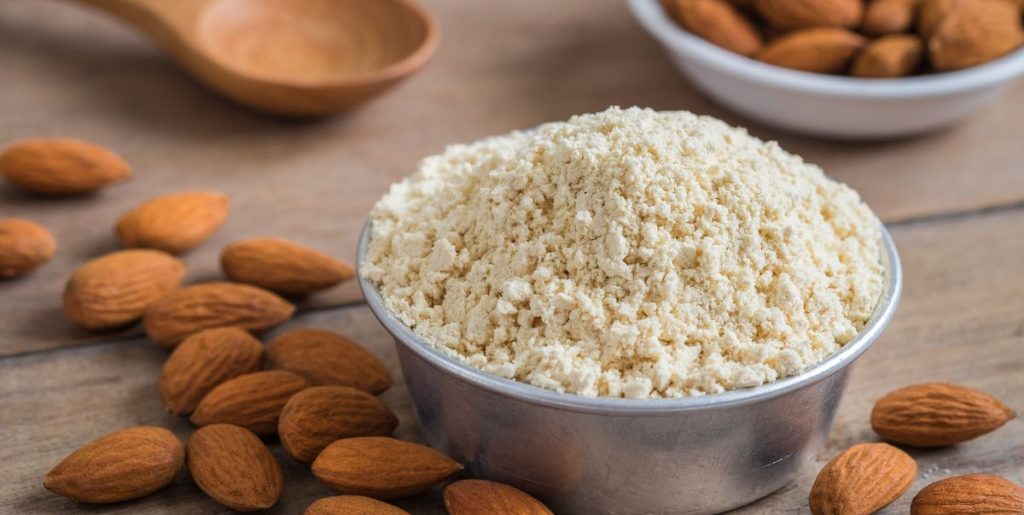Almond flour is a popular alternative to traditional wheat-based flours, offering a nutty flavor and many health benefits. But with its higher price tag, it’s important to know how long almond flour lasts so that you can make the most of your purchase. Let’s take a look at how to store almond flour and how long it will last once opened.

Table of Contents
How to Store Almond Flour
Almond flour should be stored in an airtight container in a cool, dry place away from sunlight.
If you’re looking for a longer shelf life, you can store almond flour in the refrigerator or freezer. This will help keep it fresh for up to a year—and if you freeze it, up to two years!
If you plan on using almond flour right away, it’s best to store it at room temperature in an airtight container.
Does Almond Flour Go Bad?
Yes, almond flour can go bad if not stored properly.
It should be used within three months of opening the package if stored at room temperature and six months if stored in the refrigerator or freezer.
To tell if your almond flour has gone bad, check for signs of mold or discoloration and give it a smell test before use; if there is any sign that your almond flour has gone bad, discard it immediately.
Additionally, after some time the oils in the almonds may start to turn rancid; this is also something to be aware of when storing your almond flour!
Read more: How To Know If Almond Flour Has Gone Bad?
FAQs
Can you use bread flour for cookies?
Yes, you can use bread flour for cookies.
Bread flour has a higher protein content than all-purpose flour, which means it produces more gluten. This can make your cookies chewier and denser, but not as light and airy as when using all-purpose flour. Because of this difference in texture, it is best to reserve bread flour for recipes that call for it.
If you are substituting bread flour for all-purpose flour in a cookie recipe, you may need to add an extra tablespoon or two of liquid (like water or milk) and bake the cookies a little bit longer to ensure they have time to fully cook.
Additionally, if your recipe calls for melted butter, it may be best to use all-purpose flour instead. The added gluten from the bread flour can cause the butter to separate during baking, leaving you with a greasy cookie.
Read more: Can You Use Bread Flour For Cookies? Unlock the Secret to Delicious Cookies
Can I use expired almond flour?
Almond flour can be used after it has expired, but there are some things to consider before doing so.
First and foremost, you should always check the color and smell of your almond flour before using it. If it has changed color or has a rancid odor, then it is likely no longer safe to use.
Additionally, exposure to moisture can cause almond flour to spoil, so it is important to ensure that the product has been kept in an airtight container. If after checking these aspects and you are still not sure about its safety, then it is always best to discard the expired almond flour and get a fresh batch.
Ultimately, when it comes to baking with almond flour, always use caution and use good judgement when deciding whether or not to use expired almond flour. Taking these precautions will help ensure that the ingredients you use in your recipes remain safe, fresh and tasty!
Read more: Can You Use Expired Almond Flour? Everything You Need to Know
Can almond flour be used as a thickener?
Yes, almond flour can be used as a thickener in cooking.
It is an excellent gluten-free alternative to traditional wheat and other grain flours. When mixed with water, it forms a paste that can help thicken sauces, soups, stews, and more.
Additionally, because of its nutty flavor and texture, it can be a great addition to many dishes. To use almond flour as a thickener, simply whisk together a small amount of it with some cold water until it forms a paste. Then, slowly add the paste to your recipe while stirring continuously.
It’s important to keep stirring until the desired consistency is achieved before adding any further ingredients to prevent lumps forming. Almond flour can also be used to coat foods before frying or baking, and can even be used as a crust for baked goods.
With its wide variety of uses, almond flour is a great way to get creative in the kitchen!
Read more: The Truth About Flour: Can Almond Flour Be Used As A Thickener?

Conclusion
When properly stored, almond flour can last for quite some time—upwards of two years when frozen! However, just like any other food item, improper storage can cause it to spoil quickly. Make sure you store your almond flour in an airtight container away from sunlight and moisture; this will help ensure that your almond flour stays fresh until its expiration date. If you notice any signs of mold or discoloration on your almond flour before then, discard immediately and replace with fresh product! With these tips on storage and shelf life in mind, now you’re ready to enjoy all the delicious treats that come with baking with almond flour!
References:
https://link.springer.com/article/10.1007/s13197-020-04608-x
https://www.scielo.br/j/cta/a/Dg3DDYJVzMxMfysQQj67MnD/abstract/?lang=en








